Deck 5: Sales and Collections Business Process
Question
Question
Question
Question
Question
Question
Question
Question
Question
Question
Question
Question
Question
Question
Question
Question
Question
Question
Question
Question
Question
Question
Question
Question
Question
Question
Question
Question
Question
Question
Question
Question
Question
Question
Question
Question

Unlock Deck
Sign up to unlock the cards in this deck!
Unlock Deck
Unlock Deck
1/36
Play
Full screen (f)
Deck 5: Sales and Collections Business Process
1
Business rules are unrelated to COSO control activities, although they serve an important purpose.
False
2
Refer to the following diagram. Which of the following answers provides the best interpretation of the multiplicities for the association between the Employees and the Product Categories classes?

A. Each employee must be assigned to manage at least one product category.
B. Each product category has one manager.
C. Each product category can have no managers or multiple managers.
D. Each employee can manage only one product category.

A. Each employee must be assigned to manage at least one product category.
B. Each product category has one manager.
C. Each product category can have no managers or multiple managers.
D. Each employee can manage only one product category.
Each product category has one manager
3
Which of the following best describes the purpose of a BPMN collapsed sub-process?
A. Shows the interchange between two pools.
B. Depicts the sequence of activities in one pool.
C. Contains a series of activities that are hidden from view.
D. Illustrates the process flow when an exception occurs.
A. Shows the interchange between two pools.
B. Depicts the sequence of activities in one pool.
C. Contains a series of activities that are hidden from view.
D. Illustrates the process flow when an exception occurs.
Contains a series of activities that are hidden from view
4
Type images can be used to allow process information to be summarized by category.

Unlock Deck
Unlock for access to all 36 flashcards in this deck.
Unlock Deck
k this deck
5
A BPMN process flow can start in one pool and end in the collaborating pool.

Unlock Deck
Unlock for access to all 36 flashcards in this deck.
Unlock Deck
k this deck
6
Refer to the following diagram. Which of the following answers provides the best interpretation of the multiplicities for the association between the Cash Receipt and Cash classes?
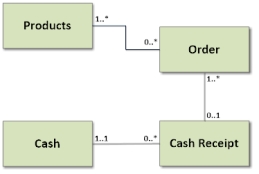
A. Each cash receipt is deposited into one bank account.
B. Each order increases accounts receivable.
C. The company only has one bank account.
D. Some cash receipts are not deposited into a bank account.

A. Each cash receipt is deposited into one bank account.
B. Each order increases accounts receivable.
C. The company only has one bank account.
D. Some cash receipts are not deposited into a bank account.

Unlock Deck
Unlock for access to all 36 flashcards in this deck.
Unlock Deck
k this deck
7
In a collaboration model using BPMN, the interaction between participants is called orchestration.

Unlock Deck
Unlock for access to all 36 flashcards in this deck.
Unlock Deck
k this deck
8
One-to-many relationships are implemented by posting a foreign key.

Unlock Deck
Unlock for access to all 36 flashcards in this deck.
Unlock Deck
k this deck
9
Which of the following best describes the purpose of an intermediate error event?
A. Shows the interchange between two pools.
B. Depicts the sequence of activities in one pool.
C. Contains a series of activities that are hidden from view.
D. Illustrates the process flow when an exception occurs.
A. Shows the interchange between two pools.
B. Depicts the sequence of activities in one pool.
C. Contains a series of activities that are hidden from view.
D. Illustrates the process flow when an exception occurs.

Unlock Deck
Unlock for access to all 36 flashcards in this deck.
Unlock Deck
k this deck
10
One-to-one relationships are implemented by creating a linking table.

Unlock Deck
Unlock for access to all 36 flashcards in this deck.
Unlock Deck
k this deck
11
BPMN models can describe the collaboration between two organizations using pools.

Unlock Deck
Unlock for access to all 36 flashcards in this deck.
Unlock Deck
k this deck
12
Review the following diagram. Which answer provides the best interpretation of the multiplicities for the association between the Quote class and the Order class?
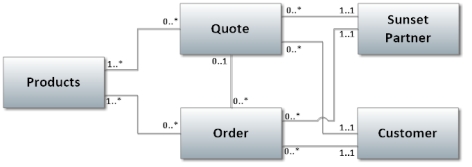
A. Quotes and orders are entered into the system at the same time.
B. Each quote may result in many future Orders.
C. The same Sunset Partner both prepares quotes and records orders.
D. Each order must result from a prior quote.

A. Quotes and orders are entered into the system at the same time.
B. Each quote may result in many future Orders.
C. The same Sunset Partner both prepares quotes and records orders.
D. Each order must result from a prior quote.

Unlock Deck
Unlock for access to all 36 flashcards in this deck.
Unlock Deck
k this deck
13
Which of the following best describes the difference between access controls and application controls?
A. Access controls limit who can change records and application controls provide an audit trail of any changes.
B. Access controls implement business rules and application controls do not.
C. Access controls are "prohibited" business rules and application controls are "allowed" business rules.
D. There is no difference between access and application controls.
A. Access controls limit who can change records and application controls provide an audit trail of any changes.
B. Access controls implement business rules and application controls do not.
C. Access controls are "prohibited" business rules and application controls are "allowed" business rules.
D. There is no difference between access and application controls.

Unlock Deck
Unlock for access to all 36 flashcards in this deck.
Unlock Deck
k this deck
14
Many-to-many relationships are implemented by posting a foreign key.

Unlock Deck
Unlock for access to all 36 flashcards in this deck.
Unlock Deck
k this deck
15
Refer to the following diagram. Which of the following answers provides the best interpretation of the multiplicities for the association between the Order class and the Products class?
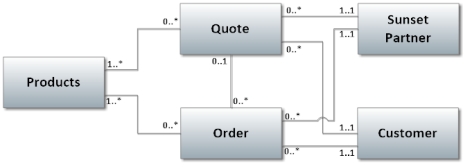
A. Each order must specify the same products as the previous quote.
B. Each product has been ordered at least once.
C. An order does not have to include a product.
D. An order may include many products.

A. Each order must specify the same products as the previous quote.
B. Each product has been ordered at least once.
C. An order does not have to include a product.
D. An order may include many products.

Unlock Deck
Unlock for access to all 36 flashcards in this deck.
Unlock Deck
k this deck
16
Application controls limit who can change records in a system.

Unlock Deck
Unlock for access to all 36 flashcards in this deck.
Unlock Deck
k this deck
17
Segregation of duties is an example of a COSO control activity.

Unlock Deck
Unlock for access to all 36 flashcards in this deck.
Unlock Deck
k this deck
18
An intermediate error event can be used to model process exceptions.

Unlock Deck
Unlock for access to all 36 flashcards in this deck.
Unlock Deck
k this deck
19
A pool in a BPMN model does not actually have to display any activities.

Unlock Deck
Unlock for access to all 36 flashcards in this deck.
Unlock Deck
k this deck
20
Refer to the following diagram. Which of the following answers provides the best interpretation of the multiplicities for the association between the Orders and Cash Receipt classes?
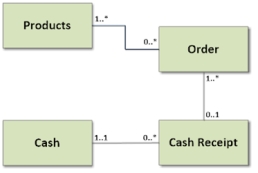
A. Some customers pay for their orders in advance.
B. Some orders result in several payments from the customers.
C. Each cash receipt pays for at least one order, but it could pay for many orders.
D. Each cash receipt pays for a minimum of 0 orders and a maximum of 1 order.
AICPA BB: Leveraging Technology
AICPA FN: Leveraging Technology

A. Some customers pay for their orders in advance.
B. Some orders result in several payments from the customers.
C. Each cash receipt pays for at least one order, but it could pay for many orders.
D. Each cash receipt pays for a minimum of 0 orders and a maximum of 1 order.
AICPA BB: Leveraging Technology
AICPA FN: Leveraging Technology

Unlock Deck
Unlock for access to all 36 flashcards in this deck.
Unlock Deck
k this deck
21
Which of the following best describes the purpose of an intermediate timer event?
A. Shows the timing of messages between two pools
B. Determines when the business process begins
C. Illustrates the process flow when a delay occurs
D. Contains a series of activities that are hidden from view
A. Shows the timing of messages between two pools
B. Determines when the business process begins
C. Illustrates the process flow when a delay occurs
D. Contains a series of activities that are hidden from view

Unlock Deck
Unlock for access to all 36 flashcards in this deck.
Unlock Deck
k this deck
22
Which of the following best describes the orchestration in a BPMN activity diagram?
A. Shows the interaction of messages between participants in the business process
B. Hides activities that are not of interest in the analysis of the business process
C. Shows the sequence of activities within one pool
D. Follows the sequence flow from start to end
A. Shows the interaction of messages between participants in the business process
B. Hides activities that are not of interest in the analysis of the business process
C. Shows the sequence of activities within one pool
D. Follows the sequence flow from start to end

Unlock Deck
Unlock for access to all 36 flashcards in this deck.
Unlock Deck
k this deck
23
Refer to the following diagram. Which of the following answers does not provide a valid interpretation of the multiplicities for the association between the Inventory and the Product Category classes?

A. Every product category is managed by one employee.
B. Every product category includes at least one inventory item.
C. Some product categories do not include inventory items.
D. Every inventory item is in at most one product category.

A. Every product category is managed by one employee.
B. Every product category includes at least one inventory item.
C. Some product categories do not include inventory items.
D. Every inventory item is in at most one product category.

Unlock Deck
Unlock for access to all 36 flashcards in this deck.
Unlock Deck
k this deck
24
Which of the following occurs at the same time a sale of goods occurs?
A. Reduction in accounts receivable
B. Increase in inventory
C. Increase in accounts payable
D. Recognition of cost of goods sold
A. Reduction in accounts receivable
B. Increase in inventory
C. Increase in accounts payable
D. Recognition of cost of goods sold

Unlock Deck
Unlock for access to all 36 flashcards in this deck.
Unlock Deck
k this deck
25
Which of the following best describes the use of type images in UML class modeling?
A. Allow companies to include graphic images in class models
B. Used to enumerate a many-to-many association between two REA classes
C. Allow modelers to distinguish between types of activities in an activity diagram
D. Allow categorization of REA classes based on management's information needs
A. Allow companies to include graphic images in class models
B. Used to enumerate a many-to-many association between two REA classes
C. Allow modelers to distinguish between types of activities in an activity diagram
D. Allow categorization of REA classes based on management's information needs

Unlock Deck
Unlock for access to all 36 flashcards in this deck.
Unlock Deck
k this deck
26
Business rules are an example of which COSO concept?
A. Internal control
B. Control activities
C. Control environment
D. Activity models
A. Internal control
B. Control activities
C. Control environment
D. Activity models

Unlock Deck
Unlock for access to all 36 flashcards in this deck.
Unlock Deck
k this deck
27
Consider the following diagram. Which of the following best describes how the relationship between Sales Orders and Products will be implemented in the resulting database?
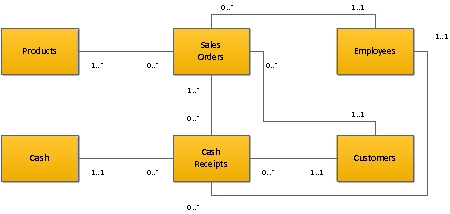
A. A new table will be created that contains both Sales Order ID and Product ID as its composite primary key
B. The Product ID will be included as a foreign key in the Sales Orders table
C. The Sales Order ID will be included as a foreign key in the Products table
D. The Quantity Ordered field will be included as a foreign key in the Products table

A. A new table will be created that contains both Sales Order ID and Product ID as its composite primary key
B. The Product ID will be included as a foreign key in the Sales Orders table
C. The Sales Order ID will be included as a foreign key in the Products table
D. The Quantity Ordered field will be included as a foreign key in the Products table

Unlock Deck
Unlock for access to all 36 flashcards in this deck.
Unlock Deck
k this deck
28
Consider the following diagram. Which of the following best describes how the relationship between Sales Orders and Cash Receipts will be implemented in the resulting database?
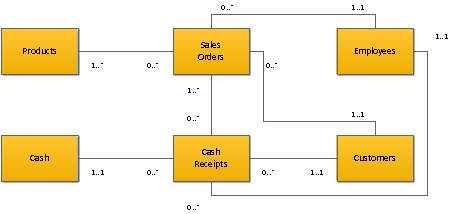
A. The Sales Order ID will be included as a foreign key in the Cash Receipts table
B. A new table will be created that contains both Sales Order ID and Cash Receipt ID as its composite primary key
C. The Cash Receipt ID will be included as a foreign key in the Sales Orders table
D. The Cash Receipt Amount field will be included as a foreign key in the Cash Receipts table

A. The Sales Order ID will be included as a foreign key in the Cash Receipts table
B. A new table will be created that contains both Sales Order ID and Cash Receipt ID as its composite primary key
C. The Cash Receipt ID will be included as a foreign key in the Sales Orders table
D. The Cash Receipt Amount field will be included as a foreign key in the Cash Receipts table

Unlock Deck
Unlock for access to all 36 flashcards in this deck.
Unlock Deck
k this deck
29
Consider the following diagram. How will the database relationship between Employees and Sales Orders be implemented?
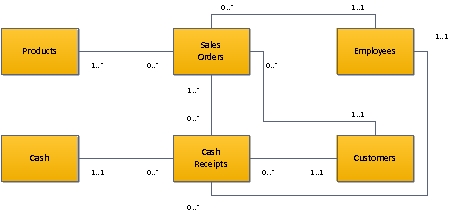
A. The Sales Order ID will be included as a foreign key in the Employees table
B. The Employee ID will be included as a primary key in the Employees table
C. The Sales Order ID will be included as a primary key in the Employees table
D. The Employee ID will be included as a foreign key in the Sales Orders table

A. The Sales Order ID will be included as a foreign key in the Employees table
B. The Employee ID will be included as a primary key in the Employees table
C. The Sales Order ID will be included as a primary key in the Employees table
D. The Employee ID will be included as a foreign key in the Sales Orders table

Unlock Deck
Unlock for access to all 36 flashcards in this deck.
Unlock Deck
k this deck
30
Consider the following diagram. Which answer provides the best interpretation of the multiplicities for the association between the Sales Orders class and the Cash Receipts class?
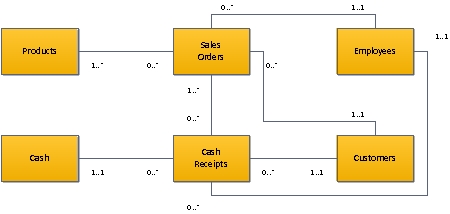
A. A single cash receipt may apply to only one sales order
B. Sales orders and cash receipts must be entered into the system at the same time
C. Customers may pay for sales orders in multiple payments
D. An employee might never record a sales order

A. A single cash receipt may apply to only one sales order
B. Sales orders and cash receipts must be entered into the system at the same time
C. Customers may pay for sales orders in multiple payments
D. An employee might never record a sales order

Unlock Deck
Unlock for access to all 36 flashcards in this deck.
Unlock Deck
k this deck
31
In the generic REA model for the sales and collections process, the multiplicities between the Sales and Cash Receipts classes are displayed with question marks. Which of the following best explains this?
A. The direction of process flow depends on the nature of the business.
B. The quantities of items sold can't be determined until the sale occurs.
C. The actual values will depend on the nature of the business.
D. The customer determines the multiplicities for this association.
A. The direction of process flow depends on the nature of the business.
B. The quantities of items sold can't be determined until the sale occurs.
C. The actual values will depend on the nature of the business.
D. The customer determines the multiplicities for this association.

Unlock Deck
Unlock for access to all 36 flashcards in this deck.
Unlock Deck
k this deck
32
Which of the following is not one of the elements to be identified when developing business rules?
A. Important business events
B. Conditions that affects the intention/objective for an event
C. Access controls that limit who can use information
D. Actions to be taken based on conditions
A. Important business events
B. Conditions that affects the intention/objective for an event
C. Access controls that limit who can use information
D. Actions to be taken based on conditions

Unlock Deck
Unlock for access to all 36 flashcards in this deck.
Unlock Deck
k this deck
33
Which of the following best describes the choreography in a BPMN activity diagram?
A. Shows the interaction of messages between participants in the business process
B. Hides activities that are not of interest in the analysis of the business process
C. Shows the sequence of activities within one pool
D. Follows the sequence flow from start to end
A. Shows the interaction of messages between participants in the business process
B. Hides activities that are not of interest in the analysis of the business process
C. Shows the sequence of activities within one pool
D. Follows the sequence flow from start to end

Unlock Deck
Unlock for access to all 36 flashcards in this deck.
Unlock Deck
k this deck
34
Which of the following activities is not associated with the sales and collection business process?
A. Recording customer payments
B. Maintaining vendor records
C. Selling products and services
D. Billing customers
A. Recording customer payments
B. Maintaining vendor records
C. Selling products and services
D. Billing customers

Unlock Deck
Unlock for access to all 36 flashcards in this deck.
Unlock Deck
k this deck
35
Consider the following diagram. How will the database relationship between Customers and Sales Orders be implemented?
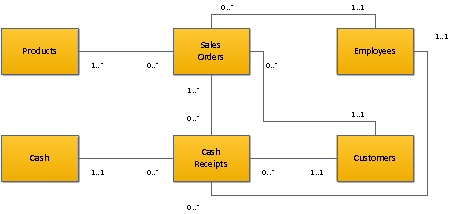
A. The Sales Order ID will be included as a foreign key in the Customers table
B. The Customer ID will be included as a foreign key in the Sales Orders table
C. The Customer ID will be included as a primary key in the Customer table
D. The Sales Order ID will be included as a primary key in the Customer table

A. The Sales Order ID will be included as a foreign key in the Customers table
B. The Customer ID will be included as a foreign key in the Sales Orders table
C. The Customer ID will be included as a primary key in the Customer table
D. The Sales Order ID will be included as a primary key in the Customer table

Unlock Deck
Unlock for access to all 36 flashcards in this deck.
Unlock Deck
k this deck
36
Which of the following best describes the purpose of an intermediate timer event?
A. Shows the timing of messages between two pools
B. Determines when the business process begins
C. Illustrates the process flow when a delay occurs
D. Contains a series of activities that are hidden from view
A. Shows the timing of messages between two pools
B. Determines when the business process begins
C. Illustrates the process flow when a delay occurs
D. Contains a series of activities that are hidden from view

Unlock Deck
Unlock for access to all 36 flashcards in this deck.
Unlock Deck
k this deck


